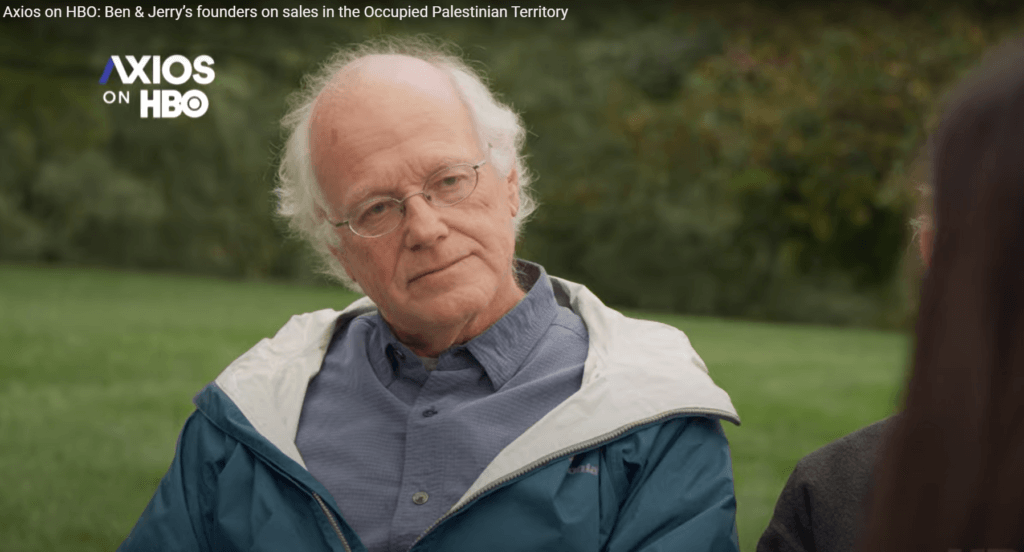Ben Cohen says he is “totally fine” with accusations of antisemitism over Ben and Jerry’s decision to stop selling ice cream in Israeli-occupied Palestinian territories because the charge is “absurd.”
Cohen and Jerry Greenfield, who cofounded the company, were interviewed by Alexi McCammond of Axios, an exchange published yesterday on Axios/HBO.
McCammond asked: “You’re both Jewish men. How does it feel personally to be wrapped up in in accusations of being antisemitic?”
Cohen responded: “Totally fine. Because it’s absurd! OK, I mean, What? I’m anti-Jewish! I mean, I’m a Jew, all my family is Jewish, my friends are Jewish.”
The answer is important because anyone who supports Palestinian rights in a meaningful way is denounced as antisemitic. When Rep. Rashida Tlaib said that Israel practices “apartheid” according to human rights reports and that’s why she wasn’t supporting more military aid to the country, two weeks ago, another Congressperson, Ted Deutch, rose on the House floor to characterize her as antisemitic.
Greenfield answered the antisemitism question: “I understand people being upset. It’s a very emotional issue for a lot of people, and I totally understand it, it’s a very painful issue for a lot of people.”
Cohen and Greenfield sold the company to Unilever in 2000, but are still involved in its decision-making,
The Ben & Jerry’s decision to boycott the occupied territories beginning next year was announced in July and followed protests at the company during the May onslaught on Gaza and a long campaign by progressives to get the company to follow through on its social justice principles with respect to the occupied territories. The backlash to the decision has included major Jewish organizations and Israeli leaders characterizing the decision as antisemitic, Arizona and New Jersey moving to divest from Unilever under anti-boycott laws, pushback from Democratic politicians such as NY Mayor Bill de Blasio, and narrow support for Ben and Jerry’s right to boycott from liberal Zionist organizations.
Cohen and Greenfield have said that they support Israel but not its occupation. Cohen said on Axios:
“We’re always in favor of the two state solution. The policy of the Israeli government has been to endorse the settlements in the occupied territories that keep on making it harder and harder to actually have a two-state solution…
It’s just saying, We don’t want our ice cream sold in the occupied territories…
Asked whether the decision was going to hurt the Israeli economy, Cohen said, “Not much. It’ s a drop in the bucket… It’s not a financial stance, it’s a policy stance…. We hugely support Israel’s right to exist, but we are against a particular policy.”
Greenfield said, “I think Ben & Jerry’s is being characterized as boycotting Israel, which is not the case at all, it’s not boycotting Israel in any way.”



Good for Ben Cohen. It takes someone with a spine to make a decision like this, knowing there are venomous people out there, who will want to make them examples, so that others will be afraid of their wrath and vicious attacks, and not do the same. It’s how the game is being played in Congress, among the media and journalists, colleges, and businesses. Whether it is a vote in Congress, or a business deciding to do what is best for them, the “anti-semitic” accusations by American zionists will be the result, always inappropriate and utterly ridiculous.
You think American Jews are terrorized about expressing the mildest criticism of Israel? According to Sylvain Cypel, a French-Jewish journalist who lived in Israel for 12 years (he did a stint as a paratrooper in the IDF), French Jews have it much worse. From page 244 of his book “The State of Israel Vs. The Jews”:
‘ One well-known French Jewish intellectual I interviewed embodied the malaise you encounter among people who like to think of themselves as open and progressive, but who go into lockdown the moment Israeli policy comes up….he said “Do you think I don’t realize that wanting to punish a call for a boycott of Israel is stupid?” Then, seeing me taking notes on what he’d just said, he froze: “No! No! You can’t quote me on that!” ‘
The title of the chapter that story is in is “No, No! You Can’t Quote Me On That!”
Fine, Ben, stop selling your ice cream in the Occupied Territories. That’s noble and shows courage on your and your partner’s part. But, please, reconsider how absurd is your call for a two-state solution and nonsensical is your support for Israel’s ‘right to exist’, whatever the hell that really means!
1 of 2
https://www.haaretz.com/opinion/.premium-the-time-has-come-to-admit-israel-is-an-apartheid-regime-1.10282855
“The Time Has Come to Admit: Israel Is an Apartheid Regime”
Yehudit Karp. Haaretz, Oct. 11/21
EXCERPTS:
“A good Jew doesn’t pronounce God’s sacred name, the tetragrammaton, out of fear & awe. And similarly, there is a word that due to a taboo, a good Zionist refrains from uttering. They believe that Israel is a democratic country with moral legitimacy to defend itself, & that security needs are a kosher correcting fluid that whites out any injustice.
“The average reader is horrified & stops reading when they encounter this word if it is referring to Israel, & believes that its attribution expresses a lie, heresy & antisemitism, & that whoever uses it is a radical leftist, an Israel-basher who hates their people & their country. The average writer, it should be admitted, also refrains from mentioning the specific word for fear that he will lose the last of his readers. And those petitioning the High Court of Justice prefer caution, arguing that wrongful discrimination exists, & for their own reasons choose not to call the facts by their hard-to-pronounce name.
“This name was given by the international community in two international conventions, to a situation that is defined as a crime, in which in order to maintain control by a group of people of one ethnic/national origin over another ethnic/national group, the government maintains a dual system of laws in a single geographic area.
“In such a system the human rights of the citizens of the reigning country are preserved, and an institutionalized regime is maintained, which includes inhumane treatment & systemic oppression of the other ethnic/national group, in a manner that undermines the basic human rights of its members. The international community called this situation ‘apartheid.’
“And this is a story about a petition submitted to the High Court of Justice by six Palestinians who are residents of the area controlled by Israel, together with Yesh Din – Volunteers for Human Rights, & Physicians for Human Rights, & an order regarding security directives, which according to the petition allows for entering & searching Palestinian homes without a judicial order or any external monitoring, & without clear limitations, thereby leaving an opening for arbitrary use of authority.” (cont’d)
2 of 2
“The petition was based on long-term documentation of entry and search methods used by the Israel Defense Forces, and of the serious collateral damage to human dignity, to people’s bodies and property, the right to privacy, individual freedom, the individual’s sense of security and as a result, to the emotional health of adults and children who are present during the search, due to shock, humiliation and fear. This damage is part and parcel of the methods of searching, which is regularly done late at night by armed soldiers who wake up the entire family and threaten them.
“The petitioners complained about the illegality of the order from the point of view of international and Israeli law, and the illegal discrimination that undermines basic rights, from which the population of the Palestinian area suffers compared to the Jewish residents. The High Court rejected the petition, with the explanation that this is not discrimination among equals, but rather a permitted distinction between populations that differ for reasons of state security, and because it believes that the basic rights of the Palestinians are preserved insofar as possible in the context of security needs.”
“I have no intention here of arguing with the court’s reasons, although I am shocked by the harsh implications of the decision on the lives of human beings who have the misfortune of being Palestinians living in the territories, who are under occupation. But I do intend in this article to illuminate two statements the court made on its way to rejecting the petition.”